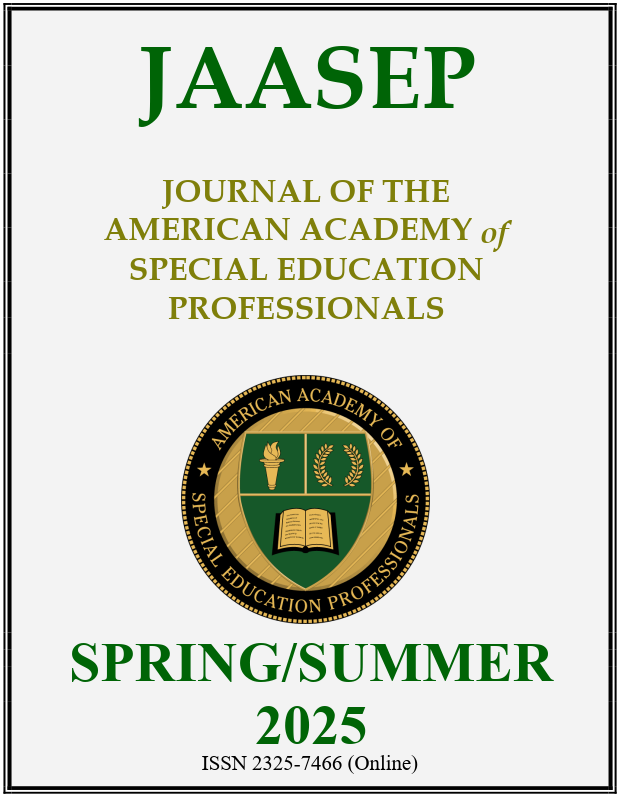Supporting Pre-service Teacher Pedagogical Development with Mursion and Video Analysis: A Pilot Study
Bandura, A. (1986). Social foundations of thought and action: A social cognitive theory. Englewood Cliffs, NJ: Prentice-Hall.
Bautista, N.U., and Boone, W.J. (2015). Exploring the impact of TeachME Lab virtual classroom teaching simulation on early childhood education majors’ self-efficacy beliefs. Journal of Science Teacher Education, 26 (3), 237–62. https://doi.org/10.1007/s10972-014-9418-8. DOI: https://doi.org/10.1007/s10972-014-9418-8
Birks, M., & Mills, J. (2015). Grounded theory: A practical guide. Sage Publications. Borko, H., Jacobs, J. Eiteljorg, E. and Pitman, M.E. (2008). Video as a tool for fostering productive discussions in Mathematics professional development. Teaching and Teacher Education, 24(2), 417–36. https://doi.org/10.1016/j.tate.2006.11.012. DOI: https://doi.org/10.1016/j.tate.2006.11.012
Brownell, M.T., Jones, N.D., Hyojong, S. Stark, K. (2019). Improving teaching quality for students with disabilities: Establishing a warrant for teacher education practice. The Journal of the Teacher Education Division of the Council for Exceptional Children, 43(1). 088840641988035. https://doi.org/10.1177/0888406419880351. DOI: https://doi.org/10.1177/0888406419880351
Charmaz, K. (2014). Constructing grounded theory. Thousand Oaks, CA: Sage Publications. Dawson, M.R. and Lignugaris/Kraft, B. (2016). Meaningful practice. Teacher Education and Special Education: The Journal of the Teacher Education Division of the Council for Exceptional Children, 40(1), 26–50. https://doi.org/10.1177/0888406416664184. DOI: https://doi.org/10.1177/0888406416664184
Denzin, N. K., & Lincoln, Y. S. (Eds.). (2011). The Sage handbook of qualitative research. Sage Publications.
Glaser, B. (1978) Theoretical sensitivity: Advances in the methodology of grounded theory. Sociology Press, Mill Valley. High-Leverage Practices Implementation Guide Explicit Instruction Overview. n.d. Accessed August 2023. https://ttaconline.org/Document/zxbIhX_YCJNRtFjPc4AKKsxwtRgUiNdk/HLP_16_Checklist.pdf.
Hudson, M.E., Voytecki, K.S., & Zhang, G. (2018). Mixed-reality teaching experiences improve preservice special education students’ perceptions of their ability to manage a classroom. Journal of Virtual Worlds Research, 11(2), 1-16. DOI: https://doi.org/10.4101/jvwr.v11i2.7308
Judge, S., Bobzien, J. Maydosz, A., Gear, S. and Katsioloudis, P. (2013). The use of visual-based simulated environments in teacher preparation. Journal of Education and Training Studie, 1(1). https://doi.org/10.11114/jets.v1i1.41. DOI: https://doi.org/10.11114/jets.v1i1.41
Landon-Hays, M., Peterson-Ahmad, M.B., Frazier, A.D. (2020). Learning to teach: How a simulated learning environment can connect theory to practice in general and special education educator preparation programs. Education Sciences, 10(7), 184. https://doi.org/10.3390/educsci10070184. DOI: https://doi.org/10.3390/educsci10070184
Maheady, L., Smith, C., and Jabot, M. (2014). Field experiences and instructional pedagogies in teacher education: What we know, don’t know, and must learn soon. In Sindelar, Paul T, Erica D Mccray, Mary T Brownell, and Benjamin Lignugaris/Kraft. 2014. Handbook of Research on Special Education Teacher Preparation. New York: Routledge.
Morin, K. L., Ganz, J.B. , Vannest, K. J., Haas, S. A., Nagro, S. A., Peltier, C. J., Fuller, M. C., and Ura, S. K. (2018). A systematic review of single-case research on video analysis as professional development for special educators. The Journal of Special Education, 53(1), 3–14. https://doi.org/10.1177/0022466918798361. DOI: https://doi.org/10.1177/0022466918798361
Nagro, S. A., deBettencourt, L. U., Rosenberg, M. S., Carran, D. T., and Weiss, M. P. (2016). The effects of guided video analysis on teacher candidates’ reflective ability and instructional skills. Teacher Education and Special Education: The Journal of the Teacher Education Division of the Council for Exceptional Children, 40(1), 7–25. https://doi.org/10.1177/0888406416680469. DOI: https://doi.org/10.1177/0888406416680469
Peterson-Ahmad, M.B. (2018). Enhancing pre-service special educator preparation through combined use of virtual simulation and instructional coaching. Education Sciences, 8(1), 10. https://doi.org/10.3390/educsci8010010. DOI: https://doi.org/10.3390/educsci8010010
Robinson, L. and Kelley, B. (2007). Developing reflective thought in preservice educators: Utilizing role-Ppays and digital video. Journal of Special Education Technology, 22(2), 31–43. https://doi.org/10.1177/016264340702200203. DOI: https://doi.org/10.1177/016264340702200203
Strauss, A., & Corbin, J. 1998. Basics of qualitative research techniques. Thousand Oaks, CA: Sage publications.
Tie, C, Birks, Y, and Francis, K. (2019). Grounded Theory Research: A Design Framework for Novice Researchers. SAGE open medicine, 7. https://doi.org/10.1177/2050312118822927. DOI: https://doi.org/10.1177/2050312118822927
Tschannen-Moran, M., & Hoy, A. (2001). Teacher efficacy: Capturing an elusive construct. Teachingand Teacher Education, 17(7), 783-805. https://doi.org/10.1016/S0742-051X(01)00036-1 DOI: https://doi.org/10.1016/S0742-051X(01)00036-1
Downloads
Article Information
- Article Type Articles
- Submitted April 9, 2025
- Published June 15, 2025
- Issue Spring/Summer 2025
- Section Articles
